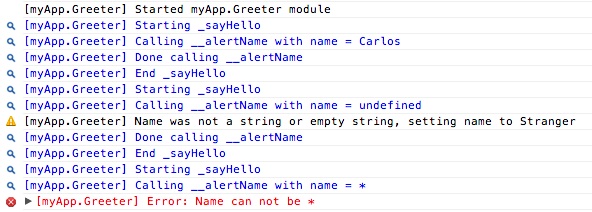JavaScript module example
View an example of how to use WL.Logger to add log messages to a JavaScript module.
This example demonstrates how to use WL.Logger to add log messages to a JavaScript module using these methods:
- myApp.Greeter.start() Initializes the module.
- myApp.Greeter.sayHello(name) Alerts a greeting to the name that is passed.
The example uses the default initOptions.js file for IBM Worklight v6.0. This list contains some of the principles that are demonstrated by the example:
- The module, myApp.Greeter.js, uses the JavaScript Revealing
Module Pattern, however the concepts in the example apply no
matter how you structure the JavaScript code.
- By using WL.Logger.create({pkg: '[package-name]'}) create a LogInstance linked to a package.
- Use a short variable name such as 1for the LogInstance makes it easier to write logs, for example: (l.log(msg), l.info(msg)
- We can log errors using the JavaScript try/catch block (synchronous
code) and failure callbacks (asynchronous code).
- We can avoid problems using correct log levels, precise package names, and by filtering as necessary.
myApp.Greeter.js
var myApp = myApp || {};
myApp.Greeter = (function (WL) {
//ECMAScript 5 strict mode
'use strict';
//Dependencies
var WL_LOGGER = WL.Logger;
//... other dependencies //Constants
var PKG_NAME = 'myApp.Greeter';
var DEFAULT_NAME = 'Stranger';
//... other constants
//LogInstance local to this module var l = WL_LOGGER.create({pkg: PKG_NAME});
//Private function to the module that does validation and alerts a name var __alertName = function (name) {
l.debug('Calling __alertName with name =', name);
if (typeof name !== 'string' || name.length < 1) {
l.warn('Name was not a string or empty string, setting name to', DEFAULT_NAME);
name = DEFAULT_NAME;
}
else if (name === '*') {
throw new Error('Name can not be *');
}
//Assume 'alert' is always a global function that exists
alert('Hello ' + name);
l.debug('Done calling __alertName');
};
//Public API function that does initialization
var _start = function () {
l.info('Started', PKG_NAME ,'module');
//... init code
};
//Public API function that alerts 'Hello [name]'
var _sayHello = function (name) {
l.debug('Starting _sayHello');
try {
__alertName(name);
} catch (e) {
//Log any errors
l.error(e);
}
l.debug('End _sayHello');
};
//Public API return {
start : _start, sayHello: _sayHello
};
}(WL)); //Pass global variables to the module
main.js
function wlCommonInit () {
myApp.Greeter.start(); //Start our application's greeter module myApp.Greeter.sayHello('Carlos'); //should alert 'Hello Carlos'
myApp.Greeter.sayHello(); //should alert 'Hello Stranger'
myApp.Greeter.sayHello('*'); //should log an error
}
index.html
<!-- ... other html tags -->
<body id="content" style="display: none;">
<!-- ... application UI -->
<script src="js/initOptions.js"></script>
<script src="js/myApp.Greeter.js"></script>
<script src="js/main.js"></script>
<!-- ... other script tags -->
</body>
Figure 1. Log output

Parent topic: Configure the MobileFirst Logger